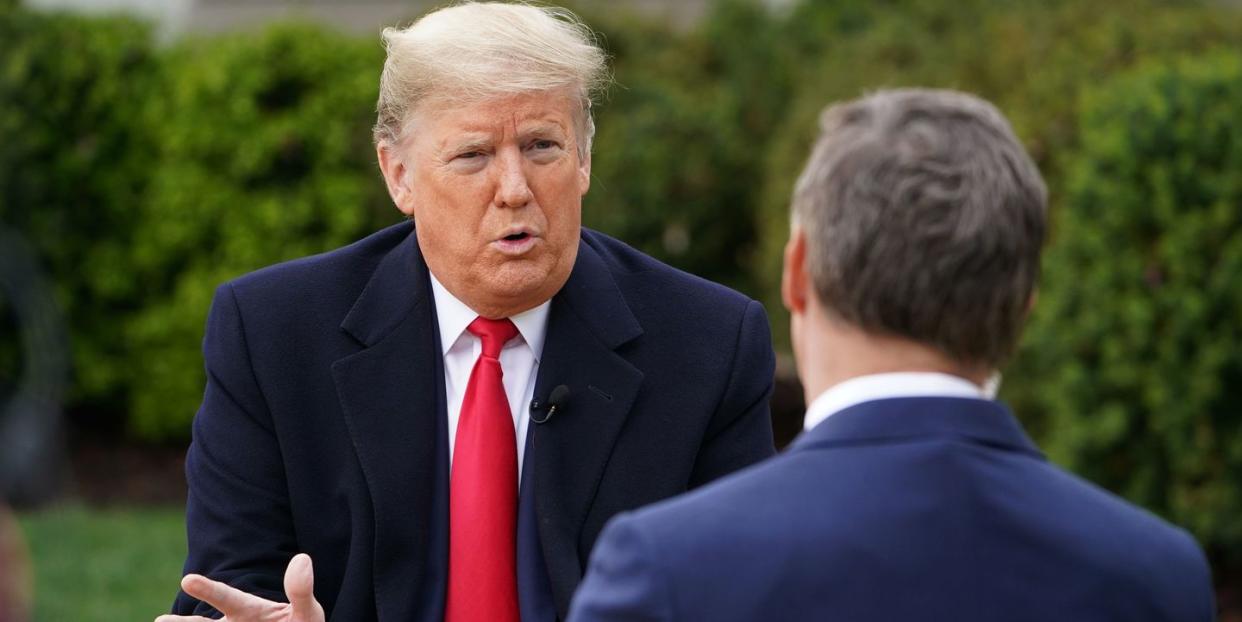Should Social Distancing Rules Be Lifted by Easter? Ask the Super Spreaders of Westport, Connecticut

Over the objections of scientists and public health officials, the White House is considering lifting the lockdowns now in place across much of the country to slow down the spread of the novel coronavirus. President Donald Trump said in a virtual town hall on Tuesday that he'd like to "have the country opened up, and just raring to go, by Easter."
If it's not stating the obvious to call that a bad idea, then consider the cautionary tale, published just earlier today, of the coronavirus cluster in Connecticut.
On March 5, about 50 people met for a birthday in the upscale town of Westport. At the time, there were no cases of the virus in the town of nearly 30,000, and so the guests assumed everyone in attendance was healthy and the epidemic still confined to Europe and Asia. That had been the working assumption for many as they tried haphazardly to follow social distancing guidelines—rules that weren't always clearly defined or enforced by the government. In early March, it still seemed alright for groups of friends to gather for a party.
That same week, President Trump himself held court at Mar-a-Lago for an entire weekend of festivities, including a formal dinner for the Brazilian president and a birthday party for Kimberly Guilfoyle, Donald Trump Jr.’s girlfriend. On the East End of Long Island, there was talk that the virus had "put a damper" on the dining scene in the Hamptons and of casual "quarantine circles" in Bellport. As recently as a two weeks ago, Tamarind and Maya's were still serving dinner in St. Bart's.

Of course, what little we know about COVID-19 now suggests that that's precisely how the virus spreads quickest: in tight-knit communities like Casalpusterlengo, the village outside of Milan where Italy's outbreak seems to have exploded. In the time since the party in Westport, half of the guests have tested positive for COVID-19. Several attendees at the events at Mar-a-Lago around the same time, including members of the Brazilian delegation, have also publicly confirmed their status.
When the annals of the crisis are written, Westport and Palm Beach will be remembered as the "party zero" of New England and the "hot zone" of South Florida, and these now infamous parties examples of what one epidemiologist called in an interview with the New York Times "a super-spreading event." They are cities where benefits and fundraisers rule the social calendar, and whose residents relish the bloodsport of gala season. As we now know, they're also viral powder kegs.
Knowing all this now, the calls to to ease social distancing rules should set off alarms. And they're not just coming from the White House. On Sunday, the former Goldman Sachs chairman Lloyd Blankfein advocated a similar approach on social media, to widespread criticism; several business leaders and conservative lawmakers have followed suit.
The cavalier attitude emanating from these corners is not confined to the powerful and wealthy. In Miami Beach, young spring breakers continued partying despite calls to go home and isolate. As the case loads and death rate climb, it's become clear that hubris is a country's worst response to a public health emergency that requires self-discipline to control if not end.
Instead of loosening self-quarantine rules, scientists are calling for "extreme social distancing." It is the only known salve to both cripple the spread of the virus, and spare the most vulnerable from infection, and it's a practice that's yielded promising results in South Korea and China, which reported zero new transmissions last week.
To do the opposite, Tom Inglesby, director of the Johns Hopkins Center for Health Security tells the Washington Post, "could kill potentially millions in the year ahead with huge social and economic impact.”
The Westport party underscores the urgency of social distancing in small communities, perhaps especially in tony enclaves whose residents fraternize often, widely, and internationally. As soon as one of the guests there found out he had tested positive, he notified local officials, who moved swiftly to track other guests, test them, and impose widespread restrictions on public life. But officials acknowledged it was too late; other party guests had since traveled and, at least in one instance, patronized a function attended by hundreds.
Densely populated cities like New York are also especially susceptible to the quick-fire nature of Coronavirus, which is why Governor Andrew Cuomo has been preaching a singular mantra at his daily briefings: Stay Home. Save Lives.
He even enlisted another television-famous businessman to spread the gospel: Jack Donaghy.
You Might Also Like